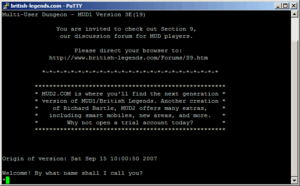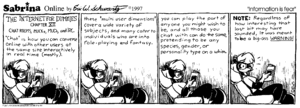We are still actively working on the spam issue.
Difference between revisions of "MUD"
(→The difference between MU* types) |
(get lamp link) |
||
| (3 intermediate revisions by 2 users not shown) | |||
| Line 16: | Line 16: | ||
To understand the difference between various MU* types, you need to look at the large history of hosting software. The primary difference between a ''MUD'', ''MUCK'', and a ''MUSH'' game is that they are simply hosted on different families of hosting software. However, one other difference between a ''MUD'' and a ''MUCK'' is that in a ''MUD'' all buildings are stationary, and new buildings can only be added by GOD (the system admin) or a Wizard (the system volunteer). In a ''MUCK'', users are allowed to make their own buildings. While ''MUD'' is Multi-User Dungeon, the other terms are simply a play on variants of "mud". They stand for nothing, however some people have given them false-definitions, such as Multi-User Character Kingdom, etc. | To understand the difference between various MU* types, you need to look at the large history of hosting software. The primary difference between a ''MUD'', ''MUCK'', and a ''MUSH'' game is that they are simply hosted on different families of hosting software. However, one other difference between a ''MUD'' and a ''MUCK'' is that in a ''MUD'' all buildings are stationary, and new buildings can only be added by GOD (the system admin) or a Wizard (the system volunteer). In a ''MUCK'', users are allowed to make their own buildings. While ''MUD'' is Multi-User Dungeon, the other terms are simply a play on variants of "mud". They stand for nothing, however some people have given them false-definitions, such as Multi-User Character Kingdom, etc. | ||
| − | A ''MOO'' is another, but rarer variant on both. In a MOO, it has a plot with a beginning and an end. This is much more like a text-adventure than any of the other ones that are role play centric/character driven. MOOs also have a large amount of bots within the game that contribute to the story as a whole. A popular MOO is [http://thxmoo.org/ thxmoo], which is hosted on [[SDF|The SDF Public UNIX System]]. | + | A ''MOO'' is another, but rarer variant on both. In a MOO, it has a plot with a beginning and an end. This is much more like a text-adventure than any of the other ones that are role play centric/character driven. MOOs also have a large amount of bots within the game that contribute to the story as a whole. A popular MOO is [http://thxmoo.org/ thxmoo], which is hosted on [[SDF|The SDF Public Access UNIX System]]. |
== Notes == | == Notes == | ||
| Line 29: | Line 29: | ||
[https://se7en.neocities.org/articles/mud.html A Guide to MU*s] | [https://se7en.neocities.org/articles/mud.html A Guide to MU*s] | ||
| − | [[Category:Video | + | [http://www.imdb.com/title/tt1756529/ Get Lamp], a documentary based on text adventures featuring the creator of the original MUD program. |
| + | |||
| + | [[Category:Video games]] | ||
[[Category:Software]] | [[Category:Software]] | ||
[[Category:History]] | [[Category:History]] | ||
| Line 35: | Line 37: | ||
[[Category:RolePlaying]] | [[Category:RolePlaying]] | ||
[[Category:Gaming]] | [[Category:Gaming]] | ||
| + | [[Category:Internet]] | ||
| + | [[Category:Cyberpunk]] | ||
| + | [[Category:1980's]] | ||
Latest revision as of 12:35, 24 February 2016
A MU* game (commonly called a MUD, though can also be called a MUCK/MUSH) is a text-based roleplaying game created in the 1970's over telnet.
Contents
How to describe it
The best method to describe a MU* is by calling it a predecessor to the MMORPG. Much like zork, the MU* is a text-based game played over the internet through the telnet protocol, entering commands for movement. However, it also allows Role Playing between users on the same server. There are many MU* types. Of these include Social MU*s, Action MU*s, etc. The Furry Fandom made many popular MU*s dating back to the late 1980's, still in use today. MU*s are a perfect place for CyberSex.
History
MUD (now referred to as MUD1), short for Multi-User Dungeon, was the first MUD game that existed. Developed in 1975, it allowed people to call the BBS-type server and play the action RP game together with many people. While the original game no longer exists, many clones now exist. One of the most famous is called Adventure.
Starting your own MU*
I just gotta say... Good luck. The MU* craze died down around 2003, and most of the information (and software) is from when OS/2 was prone to replace Windows. A popular MU* client that is still (somewhat) developed is Belfry's FuzzballMUCK software[1], running on many MU* systems. Of these include FurryMUCK, TapestriesMUCK, Socipolitical Ramifications MUCK, and many other things.
The difference between MU* types
To understand the difference between various MU* types, you need to look at the large history of hosting software. The primary difference between a MUD, MUCK, and a MUSH game is that they are simply hosted on different families of hosting software. However, one other difference between a MUD and a MUCK is that in a MUD all buildings are stationary, and new buildings can only be added by GOD (the system admin) or a Wizard (the system volunteer). In a MUCK, users are allowed to make their own buildings. While MUD is Multi-User Dungeon, the other terms are simply a play on variants of "mud". They stand for nothing, however some people have given them false-definitions, such as Multi-User Character Kingdom, etc.
A MOO is another, but rarer variant on both. In a MOO, it has a plot with a beginning and an end. This is much more like a text-adventure than any of the other ones that are role play centric/character driven. MOOs also have a large amount of bots within the game that contribute to the story as a whole. A popular MOO is thxmoo, which is hosted on The SDF Public Access UNIX System.
Notes
Previously, the software project was hosted on SourceForge, but was moved to GitHub in 2015. This shows that it is still being developed by someone, and not just sitting out in cyberSpace. The main website is here
External links
Get Lamp, a documentary based on text adventures featuring the creator of the original MUD program.

